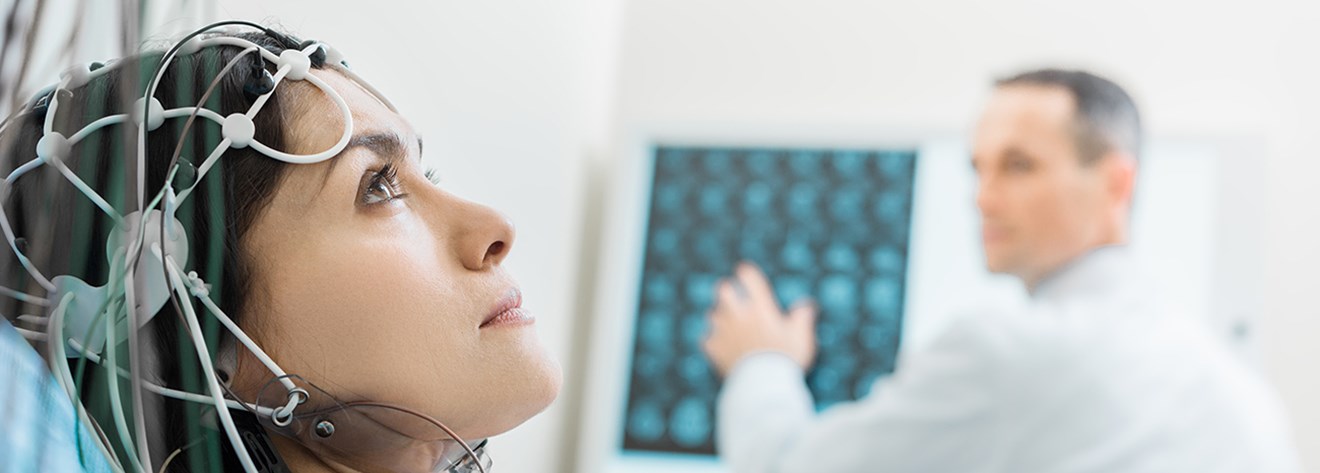Nerve Conduction Studies (NCS)
Nerve Conduction Studies are an assessment of nerve function, usually in the arms or legs. We measure how quickly your nerve impulses travel using small electrical pulses on the surface of the skin to stimulate nerves lying below. If a nerve is trapped or damaged, the impulses will be slow. Small electrical pulses are applied to the skin to stimulate the nerve below. Measurements are made to calculate and compare the conduction velocity (speed) of different nerves. Pulses feel like a sharp tingly/tapping sensation and some may cause brief muscle contractions. Most patients find this electrical stimulation acceptable, and any discomfort is only brief. Nerves conduct at optimum velocity when warm so for results to be accurate, we need limbs to be warm.
NCSs show how well the body's electrical signals are travelling to a nerve. This is done by applying small electrical shocks to the nerve and recording how the nerve works. These shocks cause a quick, mild, tingling feeling. The doctor may test several nerves.
NCS: A number of sticky electrodes are placed on the hands or feet. To test the nerve a small electrical pulse is given to the skin, and a measurement taken. This is repeated at 2 or 3 points along the arm or leg.
What is NCS?
A Clinical Physiologist and/or a Consultant Neurophysiologist will perform the test. Firstly, an assistant will check if you are warm enough for the test, and then we will briefly discuss your symptoms with you. A brief examination may also be needed. You will sit or lie on a couch for the test. To obtain the readings, a recording electrode is placed on your skin, and then another electrode on the skin is used to stimulate a nerve lying beneath. This stimulating electrode produces small electrical pulses that feel like a sharp tapping sensation. The process is repeated for a number of different nerves.
Important - STANDARD CARDIAC PACEMAKER - Nerve Conduction Studies use a small electrical current that can affect the function of a cardiac pacemaker. Such appointments may take longer than usual to arrange, and necessitate liaison with Cardiology for the pacemaker settings to be modified for the duration of the test.
Important - DEFIBRILLATING PACEMAKER (ICD) - These appointments take longer to arrange and necessitate liaison with Cardiology to enable a cardiology physiologist can be present to modify the pacemaker settings and monitor the patient's ECG throughout Neurophysiology testing.
The tests usually take 20 to 90 minutes. You can do any of your normal activities, like eating, driving, and exercising, before the tests. There are no lasting side effects. You can also do your normal activities after the tests. How long will it take? We can only decide exactly which nerves and muscles to test when you come so it is difficult to predict exactly how much will need to be done and how long it will take for each individual. However on average about a quarter of our patients require EMG. Usually though, NCS/EMG takes between 30 and 60 minutes in total.
How should I prepare for the tests?
Tell the EMG doctor if you are taking aspirin, blood thinners (like warfarin), have a pacemaker, or have hemophilia. Take a bath or shower to remove oil from your skin. Do not use body lotion on the day of the test. If you have myasthenia gravis, ask your EMG doctor if you should take any medications before the test. Please make sure your skin is clean and free from any creams, oils or lotions
- Remove as much jewellery as you can, including rings, watches and bracelets, though you may leave a wedding ring on
- Keep as warm as you can, using gloves and warm clothes as necessary
- Wear something loose and comfortable; sleeves should not be tight
- Do not stop taking any medication prescribed by your doctor unless you have specifically been told to do so
Do I need to undress? Depending on the test, you may need to remove or loosen some items of clothing, especially if your sleeves are rather tight.
Why do I need to be warm? NCS tests are only accurate if you are properly warmed up, especially your hands and feet. Nerve impulses slow down significantly even if your hands and feet are only a few degrees cooler.
Do not stop taking any of your medication unless you have been told to do so by your Consultant. However, if you are taking blood-thinning tablets such as Warfarin you should tell the doctor/technician before the test starts.
It would be helpful if you would bring a written list of your medication with you.
NCS: Most people say that the electric pulse is not painful, but that they feel an unusual sensation such as tingling or pulsing.
NCS: Approximately 30 minutes.
NCS: There are no reported risks.
